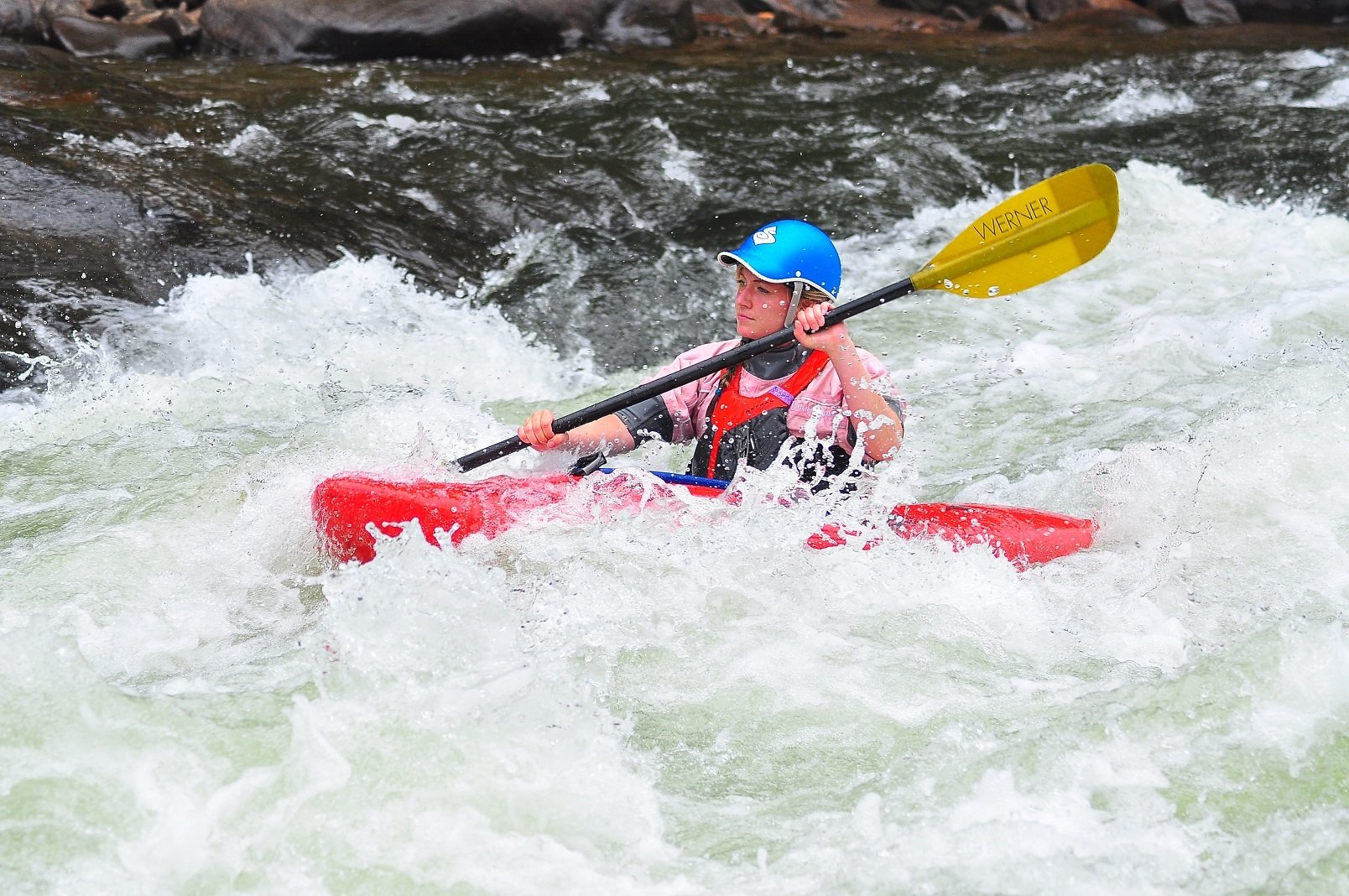Sports and STEM go hand in hand, including extreme sports. Heather Ludwig, a whitewater rafting guide and high school science teacher, is the perfect example of someone who combines her love of sport and passion for STEM to make her dream career.
Heather began her journey as a whitewater rafting guide in the spring of 2006. With summers off as a teacher, she turned to the river to cure her boredom and continued to serve as a guide until 2012, when she had her first child. Now, she focuses her time on her children but still comes back as a guide when her whitewater rafting company needs a sub. She has also taught multiple science classes, from Earth Science to AP Environmental Science. She currently teaches Environmental Geoscience and will teach Environmental Geoscience and Models of Motion next year.
Check out our Q&A with Heather for info about her two great passions – and everything you want to know about whitewater rafting!
STEM Jobs: Are there any skills that you think transferred from your teaching background to your job as a river guide and instructor?
 Heather: The instruction on the river is inherently different from classroom instruction. I rarely, if ever, raise my voice in the classroom, because I feel that the foundations of building the relationships necessary to foster learning in a classroom setting stems from creating an environment built upon mutual dignity and respect. On the river, however, I’m competing with the roar of the whitewater and people’s lives are on the line, so clear – sometimes loud, sometimes aggressive – communication can mean the difference between life and death. You could say that I’ve been known to raise my voice on the river.
Heather: The instruction on the river is inherently different from classroom instruction. I rarely, if ever, raise my voice in the classroom, because I feel that the foundations of building the relationships necessary to foster learning in a classroom setting stems from creating an environment built upon mutual dignity and respect. On the river, however, I’m competing with the roar of the whitewater and people’s lives are on the line, so clear – sometimes loud, sometimes aggressive – communication can mean the difference between life and death. You could say that I’ve been known to raise my voice on the river.
As a river guide, I feel as though I’ve learned to trust myself and others more, which gave me the wherewithal to be more confident in my personal and professional life. I also use stories and experiences from the river quite a bit when discussing hydrology and water quality testing when teaching Environmental Geoscience.
SJ: What training is necessary to become a river guide? Do you have to be certified?
Heather: The company I work for required several weeks worth of training throughout the spring season. As a product of their training program, I received training for a level of care above standard first aid, I obtained a CPR & AED certification, learned water navigation, rescue techniques and equipment use, and was required to log a total of 15 training runs in order to become officially certified in the Whitewater Safety Program accredited by the DCNR. I’ve also gone on to obtain my Wilderness and Remote First Aid Certification and have learned how to whitewater kayak in order to assist with customer safety and rescue on the river.
SJ: What are the most challenging and rewarding parts of being a whitewater rafting guide?
 Heather: The most rewarding aspects of the job, by far, have been the friendships I’ve forged with coworkers and acquaintances on the river. I am perpetually in awe of how so many people, with such different backgrounds, life goals and political views, can work together so well. I think it develops because we entrust our lives to one another. Any one person who works on that river would do just about anything to help another out in the event of an emergency. The people I work with became part of my extended and legitimate family, as I wound up marrying a fellow river guide!
Heather: The most rewarding aspects of the job, by far, have been the friendships I’ve forged with coworkers and acquaintances on the river. I am perpetually in awe of how so many people, with such different backgrounds, life goals and political views, can work together so well. I think it develops because we entrust our lives to one another. Any one person who works on that river would do just about anything to help another out in the event of an emergency. The people I work with became part of my extended and legitimate family, as I wound up marrying a fellow river guide!
I found myself physically and emotionally achieving much more than I thought I was capable of, like pulling 200+ pound men into a raft by myself, scaling large boulders,
I’m always proud when I conquer one of my fears on the water: taking on new responsibilities and roles, trying out new/challenging sections of river, navigating unfamiliar lines, jumping in a different boat, etc.
SJ: What advice would you give to students who are interested in becoming river guides or pursuing other extreme sports as a career?
Heather: That I fully support their decision! As an educator for the environmental sciences I feel that it is extremely important for people to get outside and experience nature. Studies have shown that our ‘nature connectedness’ is directly tied to an individual’s inclination to care for and protect the environment and to our individual health and well-being.
Go for it! Now! Don’t wait! Once your life becomes more established, it becomes harder to take up rogue extreme sports habits. I believe wholeheartedly that the benefits from finding a path in life that connect us to the natural world far outweigh the risks.
//
Love sports but not an athlete? Check out our tips on how to have your dream STEM career in sports! Want to learn more about the different extreme sports careers that are out there? Check out our latest issue of STEM Jobs magazine!







Leave A Comment
You must be logged in to post a comment.